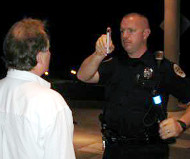6/28/2016
Washington Supreme Court Upgrades Importance Of Field Sobriety TestsWashington Supreme Court accepts refusal to take a roadside field sobriety test as evidence of drunk driving.

There is no constitutional right to refuse a roadside field sobriety test in Washington. Under a divided state Supreme Court ruling issued earlier this month, a police officer may pull over any motorist he believes might be intoxicated and ask him to perform the familiar "stop and turn" walking test, the stand on one leg test, and the eye movement test. If the driver refuses to participate, prosecutors may tell a jury that this refusal is evidence of guilt.
Motorist Mark Tracy Mecham found this out after he refused to take the "voluntary" tests that Officer Scott Campbell asked the driver to perform in Bellevue on May 15, 2011. Officer Campbell did not observe any bad driving on Mecham's part. Instead, he randomly looked up Mecham's license plate at a stop light and found an outstanding arrest warrant. During the stop, the officer noted possible signs of intoxication -- and a beer can behind the passenger seat. So Mecham was taken to the police station, where he also refused to take a breath test.
A magistrate issued a search warrant to authorize the forcible extraction of a blood sample, which was tested and found to have a blood alcohol content of 0.05, which is under the legal limit of 0.08. A toxicologist testified that it was probably 0.06 at the time he was stopped, and "possibly" 0.08. Mecham was convicted of driving under the influence of alcohol (DUI) after prosecutors introduced his refusal to take the field sobriety tests as evidence of his guilt.
Other states have deep doubts about the reliability of the field sobriety tests. In particular, the horizontal gaze nystagmus test in which an officer watches a suspect's eye movements while tracking a moving object has been widely challenged. In 2007, the Illinois Supreme Court refused to admit evidence from this test as scientifically reliable (view decision). The Oregon Court of Appeals came to the same conclusion in 2010 (view case).
Reliability was not the issue in the Washington state case, rather it was whether there is a constitutional right to refuse the tests, because prosecutors are not allowed to use the refusal to waive a constitutional right as evidence of consciousness of guilt in a trial. So the 5 to 4 high court majority decided that the physical roadside tests are not Fourth Amendment "searches," so, therefore, there is no constitutional right to refuse one. Mecham's attorneys insisted that it was a search.
"We reject this argument because FSTs [field sobriety tests] reveal only some physical characteristics associated with inebriation, none of which is substantially different from the characteristics a person would observe from simple observation of the defendant," Justice Charlie Wiggins wrote for the court majority. "Since Mecham's refusal to perform an FST was not an exercise of a constitutional right, the trial court properly permitted the prosecutor to introduce evidence of the defendant's refusal at trial and comment on that refusal during closing argument."
Several separate dissenting and concurring opinions were filed, highlighting the ideological split on the bench. Justice Charles W. Johnson blasted the majority for producing a muddled work that "overcomplicates and confuses the issue." Johnson and Justice Susan Owens would have reversed Mecham's conviction.
"The lead opinion loses track of the fundamental nature of what this case concerns--that is, a citizen's right to choose to do something or not," Justice Johnson wrote in a dissent. For the principles of voluntariness or consent to have any meaning, the only conclusion flowing from this choice is simply that-a choice was made. No evidentiary relevance should flow from this choice."
A copy of the decision is available in a 1.9mb PDF file at the source link below.


